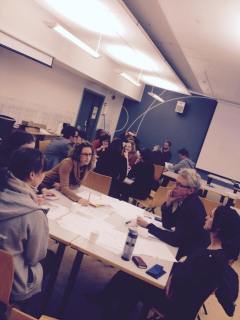The Humanitarian Innovation and Design seminar took place at the department of product design at NTNU the 11th of March.
A major part of the seminar was allocated to brief presentations, with following questions and discussions. A final group work session elaborated upon the questions that had emerged during the day. A significant part of the discussions was related to education and research at NTNU within the topic of humanitarian innovation, including:
- HUMANITARIAN PROJECT INVENTORY: Within NTNU as well as nationally there is no inventory of researchers or projects relating to humanitarian innovation. Connecting people working with similar issues would be an asset for a HI Lab.
- CONTEXTUALIZATION COURSES: The topic of contextualization had been brought up by one presentation about an energy project in Ethiopia and a resulting discussion was concerned with how the different departments can better collaborate regarding field research and preparations for field work.
- INTRO COURSES: Crash course as an introduction to humanitarian landscape at NTNU
- CO DESIGN: the HI Lab should link people with NGOs, companies and locals
- MAKE MORE NOISE: There is currently no arena for designers of technologies to ‘test’ out their innovations in terms of an expert panel, or similar.
- ETHICS: in social sciences Ethics is an integrated part of coursework; in technology educations less so.
- PARTNERSHIPS: how should practitioners and researchers work together?
- IDENTIFYING ‘REAL PROBLEMS’: the HI Lab must have a determined approach to make sure it is real problems of humanitarian action that are ‘treated’ instead of symptoms.
The course included a broad spectrum of NTNU departments; from the Department of Product design, the Department of Geography/Development studies, the Department of Urban Design and Planning, the Department of Computer and Information Science and the Department of Energy and Process Engineering. In addition there was one enterprise operating in the humanitarian market (Morpho Solar), as well as Engineers without Borders.


Reblogged this on Design for Self-Reliance.
LikeLike